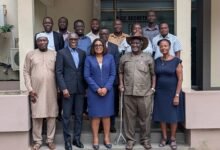Maritime affairs, security training ends at RMU

A six-week maritime affairs and security training, as part of efforts to combat maritime insecurity in the Gulf of Guinea has ended at the Regional Maritime University (RMU) in Accra on Friday.
The training which was under the European Union (EU) Support to West Africa Integrated Maritime Security (SWAIMS) programme was the third edition which saw countries including Ivory Coast, Benin, Togo, Nigeria and Ghana participating.
Participants were taken through various areas of maritime insecurity by renowned experts from maritime industry, defense and security, shipping and fishing industry, the academia and research institutions.
Speaking at the closing ceremony, the Vice Chancellor of the RMU, Dr Jethro W. Brooks said, the course was essential as it would help build capacity and competencies of staff and personnel of maritime focus agencies and institutions across the West African Region in combating crimes in the Gulf of Guinea.
He said, one of the major obstacles to harnessing the huge resources of the maritime sector for rapid economic development was the growing number of transnational organised crimes such as matime piracy, kidnappings of crew for ransom, illegal fishing, illicit trade and smuggling which were common place in the Gulf of Guinea.
“To win the fight against maritime piracy and other transnational organised crimes at sea requires well trained professionals backed by resources and legal frameworks to ensure criminals are brought to justice to serve as deterrence,” he stated.
He added that, this could be achieved when stakeholders understood the problem and what was needed to be done from a common viewpoint.
“Through collaborative efforts of Gulf of Guinea states and with support from international partners such as SWAIMS in areas of equipment and training, the region recorded significant decline in maritime piracy incidents in 2021 and 2022,” he stated.
However he said, the fight against maritime crime has not yet be won as it would require increased collaboration, coordination and information sharing among stakeholders in the fight against maritime crimes and its related threats to economic development.
He therefore urged participants to use the knowledge acquired from the training to contribute effectively in the fight against maritime sector criminality in their respective areas of work.
The SWAIMS Project Coordinator, Ing. Augustus Addy Lamptey commended all 18 participants for their efforts and contributions during the six-week training period.
He said, they assembled a cross functional group of participants representing almost all the agencies in the maritime security value chain and urged them to collaborate with each other to fight maritime crime.
“The interagency collaborations or engagements even at the classroom level have been a good experience. Hence, the networking fostered amongst the graduates is of vital importance which must be utilised,” he stressed.
He expressed appreciation to the AU delegation, ECOWAS and RMU Management for their contributions in ensuring a very successful training which would go a long way to change the fortunes of the maritime sector for the better.
BY MICHAEL D. ABAYATEYE






